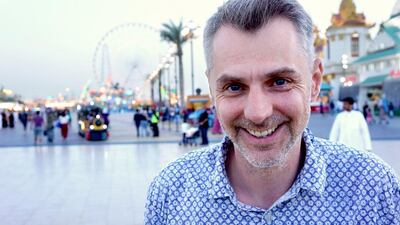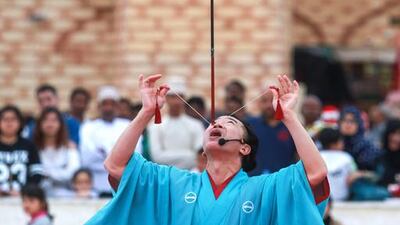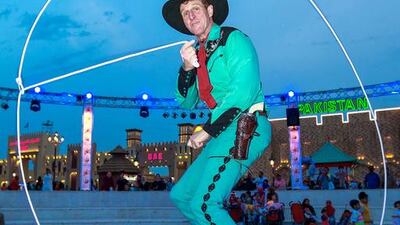There are so many sharks in the performance industry, feels Stuart Every, that it merits an umbrella organisation for street theatre artists, the freewheeling performers who travel the world from festival to festival and event to event to make a living.
His Dubai-based small business Dolphin Creative, which he says has 800 professional street performers from across the globe on its books, aims to do so.
Altruism aside, it has also hit upon an attractive niche fuelled by the demand in the UAE from malls and outdoor spaces such as Global Village and Dubai Marina for indoor and outdoor impromptu performances to attract shoppers. It also banks upon Dubai’s strategic location in the middle of key itineraries the travelling performers undertake a few times a year.
Street performance, including acrobatics, knife-throwing, playing music and juggling, is also known as busking and involves performing in public spaces for gratuities. The trend has organised itself in the Americas, Europe and Australasia with festivals and events that handsomely support such performers. It is unlike South Asia, where public performers usually carry on the occupation handed down through generations, are often destitute and are part of a dying tradition.
“The UAE is like Las Vegas for families, and street theatre is the best for family entertainment,” says Mr Every, 47.
His next show is at Dubai Marina, sponsored by Emaar Properties. Through Saturday between 2pm and 10pm, Dubai Marina will host the sixth street festival where 33 international artists will perform more than 530 free shows.
Dolphin Creative, which calls itself an open theatre production company, represents unicyclists, clowns and 3D chalk artists, among other performers. Outside the Arabian Gulf, such performers would typically perform on streets or in parks as part of a festival such as Edinburgh Festival Fringe or Glastonbury Festival in Somerset in the UK, or the Fringe World Festival in Perth, Australia.
The market size of such open performances in the region is unknown, since it is a new trend here. But last year Edinburgh Festival Fringe, one of the largest and best-known arts festivals in the world, sold 2.3 million tickets and its revenue touched £1 million (Dh5.3m) for the first time. The festival was first organised in 1947.
“I would say the market is probably around Dh20m [in the UAE], however, with all the theme parks due to come in I think there is a big area of growth as street theatre is a natural way to entertain people,” Mr Every says.
Started at the height of global recession in 2010 in Dubai, the small business owner says it is better to start a business in the middle of recession because then one can negotiate harder in property and administration charges.
“And when you come out of the recession, you will be stronger. It makes you lean and focused,” he says.
With start-up costs at Dh50,000, the company broke even within six months. Its turnover last year was Dh5m, and expects to do Dh7m this year.
“It started off hand-to-mouth, but now we have enough cash for a year,” he says. “I was never a performer but good at numbers.”
Mr Every came to Dubai in 2008 as the events and promotions manager for Dubai Festival City, where he stayed for two years. He had previously worked in the UK for various event management companies.
He knew the performers, and he knew what the malls here were looking for in terms of entertainment for publicity and footfall.
His first big show was at the Dubai Marina Mall in 2011, where he brought eight performers from the UK.
Since then, he has organised shows at Dubai Marina or Global Village with several artists and even smaller events with one or two performers.
The total cost per show varies from Dh10,000 to Dh2m, depending on the number of artists performing, the length of the show, the time of the year and who the artist is.
During his time at Dubai Festival City he saw the appetite for events such as Monster Truck Dubai, Dubai Festival Fringe and the Chinese State Circus, among others.
“This was my first time in the Middle East to live and work, and I saw the amazing potential of region – you can hit India, China and Europe from here, and there are good tax advantages,” he says.
This year he expects to have 3,000 shows, up from 2,000 last year. The average show has about 100 people, he says. He has also organised 15 street theatre festivals, including those in Sudan, Kuwait and Muscat.
His biggest competitors are traditional event management companies.
For self-preservation, Dolphin Creative has an informal policy that says the artists on its register will have to be booked through the company for work in the UAE.
The biggest challenges include the small window of confirmation from some of the organisers for the shows. Where ideally it should be two to four months, the company usually gets a notice of two to four weeks. The other is the difficulty of getting its name out there.
The company works from a tiny office in Al Barsha, Dubai, and recently got a warehouse in Ajman, where it stores audio speakers and other equipment.
Globally, the big season for such performances is June to August. In the UAE, the season is from November to April, but is expanding.
To be in Dolphin Creative’s books, an artist needs to be “good and seriously funny, make people laugh, can’t use too much language, and the skill is to coordinate in front of people”, he says.
“Every artist creates his or her show. They want to travel around the world, and be their own boss,” Mr Every says.
While most of the artists are from Europe, Australia, South America, Canada, Japan, the US and South Korea, a few are from the Middle East.
At the Emaar-sponsored Dubai Marina Street Festival this month that will take over the stretch from Marina Walk to Damac’s The Waves building, artists from 10 countries will perform. They include the Japanese musician Matsumoto Zoko, Pop the Balloon Man from the UK and the puppeteer Thomas Herfort from Germany.
A good artist can earn US$1,000 to $3,000 a day for performing three hours at big festivals in the US, Canada and Australia. In the UAE, it would be between Dh3,000 and Dh5,000 a day.
All artists get paid the same at any one festival or show organised by Dolphin. “Because it’s hard to judge who got a better show,” Mr Every says.
Because the performers cannot pass around the hat here, the malls and the organisers pay the airfare, accommodation, visa and for the lights and staffing. Dolphin Creative buys a blanket insurance for every artist. It takes a fee of 25 per cent of the lump sum sponsors pay.
Every year, Mr Every and his colleagues go to see the performers do their acts at festivals around the world such as in London’s Covent Garden, Vancouver in Canada, Key West in Florida, or the French and Australian festivals.
“I like to see a show that goes poorly, because you want an artist who can turn that around and make it a better show,” he says. “Moreover, there is something in their eyes, the artists who genuinely want to make people happy, you can’t see that in a video.”
As the artists are from around the world, many of whom have not been to Middle East previously, Mr Every gives them a brief before every show. One cannot swear or mention pork and alcohol, and there is a need to be respectful.
Eventually, Mr Every wants to do the biggest street theatre festival in the world in the UAE with 100 to 200 artists. He also wants to open an office in Singapore.
“I want to turn Dubai into a street theatre hub,” he says.
ssahoo@thenational.ae
Follow The National's Business section on Twitter









